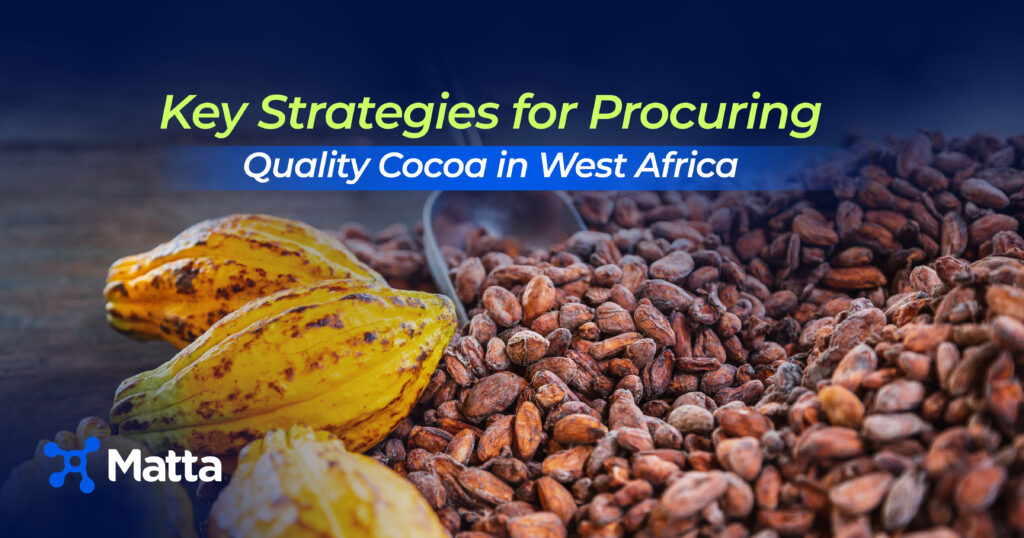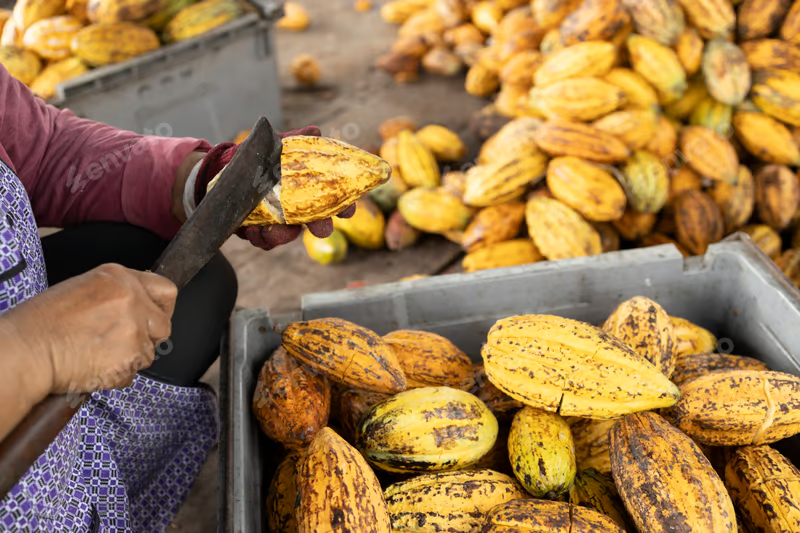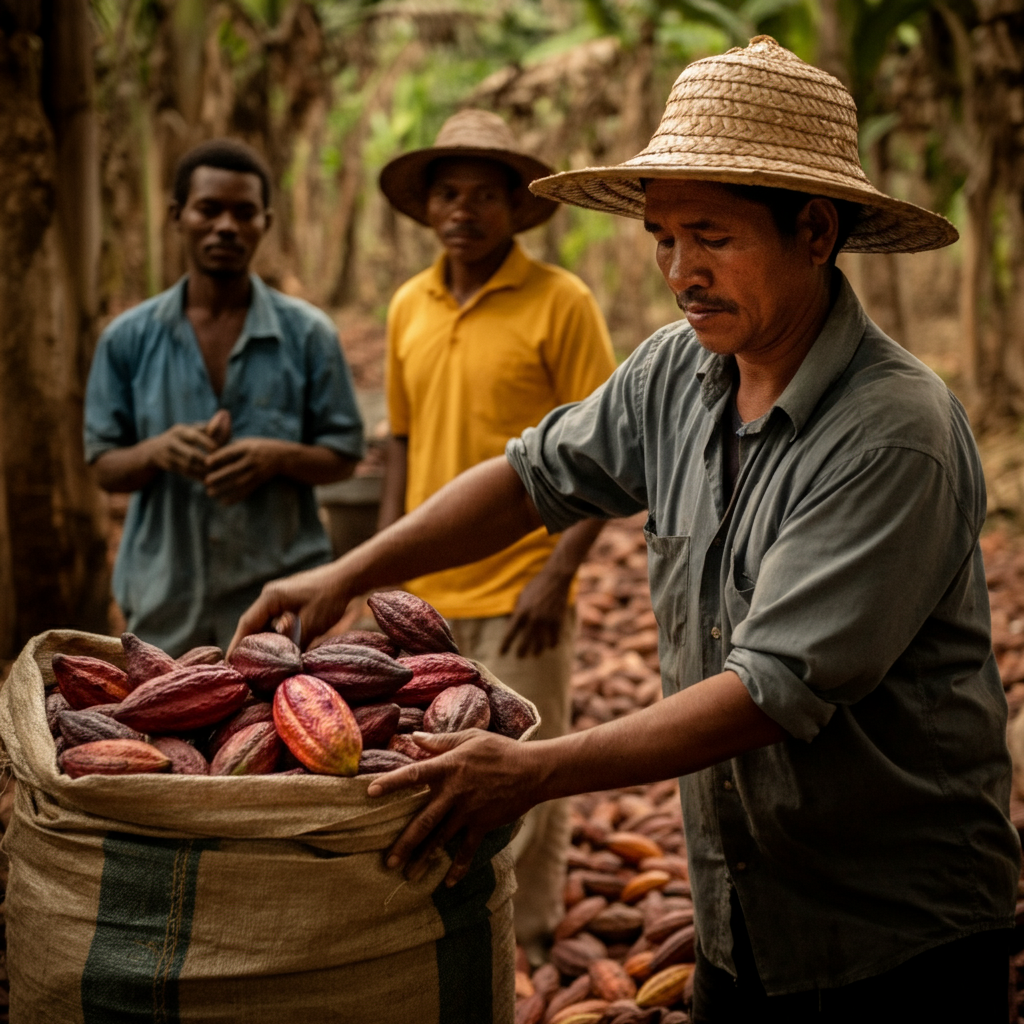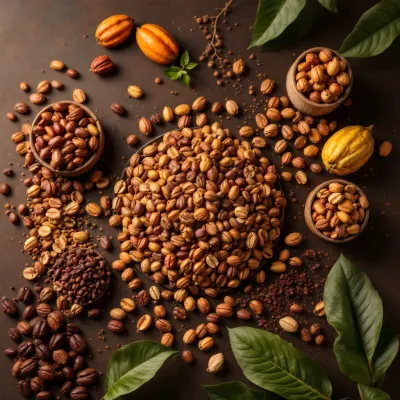
West Africa is crucial in the global cocoa value chain, making it a hotspot for procuring quality cocoa. With 3.9 million tonnes of production in 2022, the region is home to the largest cocoa-producing countries worldwide.
According to the Center for International Forestry Research and World Agroforestry, 70% of the world’s cocoa is produced in Côte d’Ivoire (40%), Ghana (20%), Nigeria (5%) and Cameroon (5%), all located in West and Central Africa.
In Ghana, about 800,000 families generate $ 2 billion annually through foreign exchange earnings on the back of exports. Meanwhile, Côte d’Ivoire employs about 600,000 cocoa farmers and another 6 million people across the value chain. (SOURCE)
This dominance positions West Africa as a key global player in the cocoa value chain. However, sourcing top-quality cocoa at competitive prices in West Africa requires a combination of many factors, the most important of which is understanding the commodity’s value chain in the region.
In this article, we will explore the value chain of cocoa in West Africa, the stakeholders involved, best practices for sourcing, and how working with an organisation like Matta can enhance efficient sourcing.
Check out our earlier article, The Complete Guide to Importing Cocoa from Nigeria

Understanding the West African Cocoa Value Chain
The cocoa value chain starts with the tropical cacao fruit or cocoa tree. Farmers within 25 degrees of the equator grow cacao, often as part of various seasonal crops, and harvest the fruits weekly.
In West Africa, where most of the world’s cacao is grown, the cocoa value chain often involves farmers, intermediaries, collectors, local buyers (in some cases, the government), local processors, or large international buyers who distribute the cacao to chocolate makers and cosmetics companies.
To source effectively, you need to understand the value chain. Let’s outline the steps involved in the Cocoa value chain;
- Cultivation (Farming): The foundation of the entire process lies with the (mostly) smallholder farmers. These farmers nurture the cocoa trees, possessing invaluable knowledge on seeds, soil fertility, and other critical information, mostly passed down through generations.
- Harvesting: Harvesting cocoa pods and extracting the beans is labour-intensive and requires careful attention to detail. This stage, primarily managed by farmers, is crucial because it sets the stage for subsequent flavour development.
- Fermentation: Following harvest, the extracted beans undergo fermentation, a crucial step in developing the distinct cocoa flavour. This process demands expertise and precision.
- Drying: The fermented beans are dried in the sun to reduce their moisture content. This step is critical to preventing mould and preserving quality. However, if the drying process is not done correctly, it can significantly impact the final product.
- Trade (Aggregation): Once dried, the beans are typically sold to local buyers or cooperatives, who often act as intermediaries between farmers and more prominent players in the value chain.
- Processing: The beans are processed into cocoa mass, butter, and powder. Depending on the scale of the operation, this processing can occur locally within West Africa or in factories abroad.
- Distribution: The processed cocoa products are distributed to international distributors, who then sell them to manufacturers who use them to create finished products.
Retail: Finally, the finished products reach consumers through various retail channels, completing the journey from bean to bar.

Key Stakeholders in West Africa’s Cocoa Value Chain
The West African cocoa value chain is a complex network of interconnected stakeholders, each playing a vital role.
Key stakeholders include;
Smallholder Farmers
Smallholder farmers are the lifeblood of West African cocoa production. Their hard work and dedication form the very foundation of the industry. In many cases, most smallholder farmers have limited access to knowledge and structured financing. To make the most of the cocoa value chain in West Africa, it is vital to empower smallholder farmers.
Cooperatives
Cooperatives have long been vital support systems for African farmers. They provide a platform for smallholders to access seeds, pool resources, access finance options, and collectively negotiate better prices for their produce. In many cases, cooperatives also play a crucial role in offtaking cocoa beans, providing a reliable route to market for their members.
Local Aggregators
According to the International Cocoa Organization, The global supply of cocoa as of 2023/2024 was 4.4 million tonnes, with a demand of 4.7 million.
Local aggregators can play a pivotal role in bridging this gap and connecting farmers to larger markets. They are critical in consolidating smaller harvests from numerous farmers, creating the volumes needed for efficient trade and logistics. Their expertise in local sourcing, quality control, and market dynamics is invaluable.
At Matta, we recognise aggregators’ crucial role within the ecosystem and empower them with the tools and resources they need to thrive. By providing access to technology, finance, and market information, we help them streamline their operations, improve efficiency, and ultimately deliver more value to the farmers they work with.
Processors
Processors are key to adding value to the West African cocoa value chain. Transforming raw cocoa beans into semi-finished products within the region creates jobs and increases the economic benefits accruing to producing countries.
According to the World Bank, Agriculture and agribusiness are projected to be a US1 trillion industry in Sub-saharan Africa by 2030. There’s immense untapped potential for cocoa processing in West Africa. This is a broader trend – the opportunity for value addition across various African commodities is enormous.
Manufacturers
Manufacturers, the creators of the final products, play a vital role in shaping consumer perceptions and driving demand. Improving the connection between manufacturers and the origin of their cocoa can lead to better quality, fairer pricing, and more sustainable practices.
At Matta, we support manufacturers by providing them with the tools and resources they need to succeed. This includes access to quality CRIC (Chemicals, raw materials, Ingredients, and Commodities), finance, market insights, and efficient logistics solutions.
Consumers
Ultimately, the consumer’s preferences and purchasing habits shape the cocoa industry. There’s a growing interest in higher-quality cocoa, with consumers seeking single-origin chocolates and exploring different flavour profiles. Manufacturers, traders, and farmers must pay close attention to these evolving needs.
LEARN WITH MATTA: Single-origin chocolates are a special kind of chocolate in which all the cocoa beans used come from a single location. This could be a specific country, region, or even a single farm or plantation.

Key Strategies for Procuring Quality Cocoa in West Africa
Securing consistently high-quality cocoa necessitates a well-defined strategy encompassing several critical elements:
- Strategic Partnerships: Working closely with local aggregators and others is essential to maximising cocoa or any commodity in Africa. With the right partnerships, procurement teams can effectively navigate the complexities of Africa’s commodities market. These aggregators possess invaluable local knowledge, established networks with farmers and cooperatives, and expertise in quality control at the source. They act as a crucial link, connecting procurement teams with the diverse players in the value chain while ensuring quality standards are met.
- Direct Sourcing (Where Feasible): While working with aggregators is highly recommended for efficiency and local market expertise, exploring opportunities for direct sourcing from the farms. Although this approach ensures transparency and efficiency, it takes proper planning and access to real-time data to source directly, especially with agro-commodities.
- Rigorous Quality Control: Stringent quality control measures throughout the sourcing process are essential. This includes assessing beans for size, moisture content, defects, and flavour profiles. Farmers and community aggregators play a crucial role by implementing initial quality checks at the farm level. Procurement teams can then refine these assessments further at later stages.
- Prioritising Sustainability: Sustainability is no longer a mere buzzword; it’s a fundamental requirement. Procurement strategies must prioritise ethically sourced cocoa and support farmers and farming communities who employ environmentally responsible practices, ensure fair labour conditions, and actively combat deforestation. Certifications like Fairtrade and Rainforest Alliance provide valuable assurances.
- Market Intelligence and Due Diligence: Staying informed about market trends, cocoa price fluctuations, and regulatory changes is crucial for effective procurement. Real-time updates from partners across the value chain can provide real-time market intelligence and help procurement teams stay proactive.

Access West Africa’s Cocoa Value Chain with Matta
More than 90% of the global Cocoa production comes from an estimated 5 to 6 million smallholder farmers. However, on average, cocoa farmers earn just 6% of the final value of a bar of chocolate.
Matta is leveraging technology to support smallholder farmers by aggregating their stock and connecting them directly to buyers, eliminating the need for multiple middlemen.
At Matta, we are committed to streamlining sourcing for manufacturers of cocoa-based products globally. We leverage our deep understanding of the local landscape to connect farmers and aggregators to a ready market.
With cocoa availability at historical lows, finding quality cocoa beans is more challenging than ever. Partnering with experts such as Matta can streamline cocoa sourcing in West Africa.
Here’s how we can make a difference:
- Extensive network: Leveraging our data resources and agent network, Matta has access to communities of vetted farmers, cooperatives, and reputable local aggregators, guaranteeing a consistent supply of quality cocoa and other commodities across Africa.
- Local Expertise: Our team has deep roots in the West Africa cocoa-producing regions, thus providing our strategic partners with valuable market insights that help them avoid the complexities of the region’s cocoa value chain.
- Quality Assurance: We implement robust quality checks throughout the sourcing process, from the farm to the warehouse, ensuring that only the finest cocoa beans reach our partners.
- Commitment to Sustainability: Matta is dedicated to promoting sustainable and ethical cocoa production, aligning with global standards and consumer expectations while supporting stakeholders within the cocoa value chain.
- Streamlined Logistics: We handle the intricate logistics of cocoa procurement, simplifying the process for buyers and ensuring timely delivery worldwide.
Rounding Up:
Cocoa prices have skyrocketed in months. According to JP Morgan, prices went as high as $10,000 per metric ton in early 2024. While there’s been a slight price decline, the 2024/2025 season is projected to see a rise in prices due to the global cocoa shortage.
Procuring high-quality cocoa from West Africa requires a collaborative approach. Partnering with experienced local aggregators like Matta is vital for navigating the complexities of the value chain, ensuring quality, and prioritising sustainability.
Working together can empower farmers, enhance transparency, and ensure a bright future for the West African cocoa industry and the global value chain.
We look forward to further empowering Africa’s industrial renaissance.
Thank you for reading.
Contact Matta
